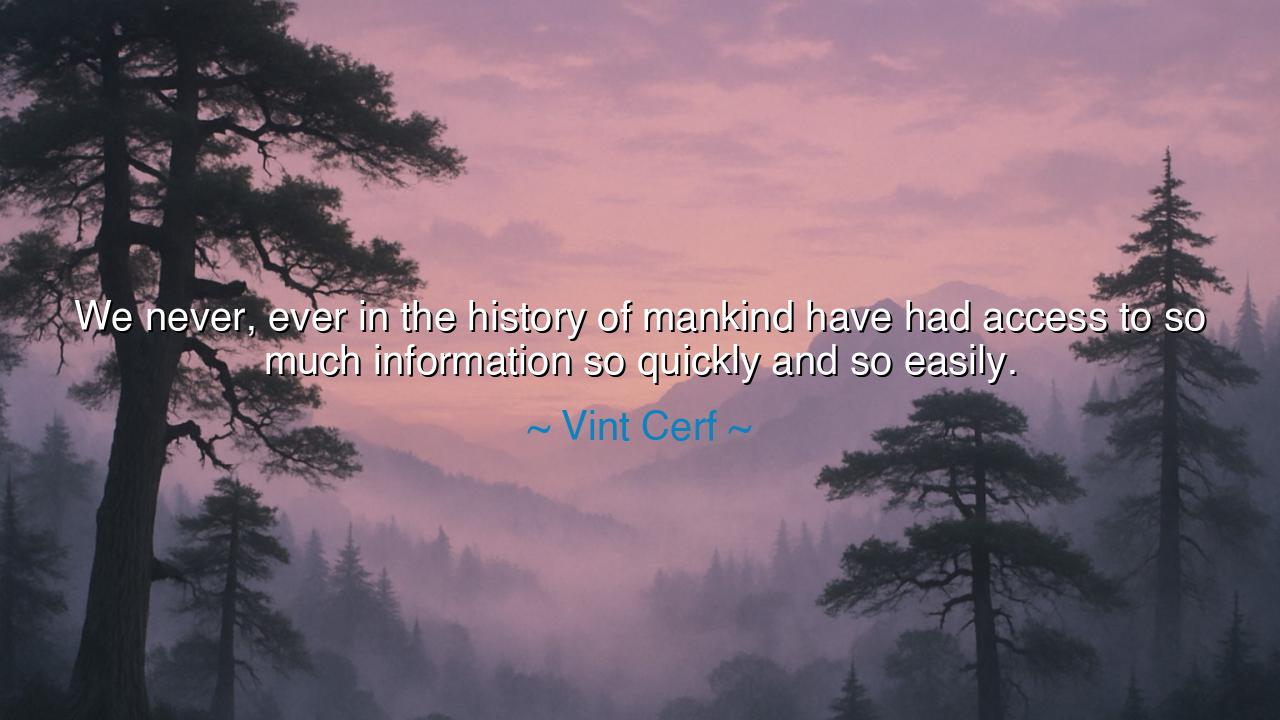
We never, ever in the history of mankind have had access to so
We never, ever in the history of mankind have had access to so much information so quickly and so easily.






“We never, ever in the history of mankind have had access to so much information so quickly and so easily.” So declared Vint Cerf, one of the founding fathers of the Internet — a man whose hands helped weave the invisible web that now binds the thoughts of the world together. His words are both awe and warning, both song and lament. For in this age of light-speed knowledge, humanity stands at a crossroads: to rise to wisdom through information, or to drown beneath its endless tide. The ancients once worshiped the flame of knowledge as sacred; now we sit before a roaring fire that threatens to consume as much as it illuminates.
In times long past, a single scroll of wisdom was a treasure guarded by temples and kings. The seekers of truth — philosophers, monks, wanderers — traveled great distances to touch the parchment of learning. Information was then rare, precious, like water in a desert. But today, the desert has turned to flood. Every whisper, every thought, every deceit and discovery alike, flows ceaselessly through the rivers of the digital age. Cerf’s declaration marks a turning point in the human story — for the question is no longer how to find knowledge, but how to bear it.
Consider the tale of the Library of Alexandria, that ancient beacon of wisdom which once gathered the learning of the world. Scholars came from every land to study its scrolls, to listen, to argue, to dream. When it was burned — by time, by war, by neglect — a thousand years of learning turned to smoke. Humanity wept for the loss. But now, we carry a thousand Alexandrias in the palms of our hands. What once perished in flame now multiplies in light. And yet, do we read? Do we ponder? Or do we merely scroll, our minds grazing across the surface of oceans too vast to drink from?
Vint Cerf, in his quiet foresight, understood that power without reflection is peril. The abundance of information does not make us wise; it tempts us to mistake knowing for understanding, and noise for truth. A man who can summon the wisdom of centuries with a click may still be blind to the meaning of his own heart. The ancients warned that the mind, like a vessel, must be shaped before it is filled, lest it crack under the weight of what it holds. So too must we cultivate discernment — the art of knowing what to seek, what to believe, and what to let pass into silence.
There was once a story told of Socrates, who was offered the chance to learn through writing — a new technology of his age. Yet he hesitated, fearing that written words might weaken the memory and the soul’s inner dialogue. How strange, and how familiar! For we too face his dilemma, magnified a thousandfold. Our tools have grown godlike, but our hearts remain mortal. We carry the world’s wisdom in our pockets, yet we lose ourselves in its labyrinth, mistaking the glitter of data for the light of truth. The question that haunted Socrates — how to live wisely — returns now with greater urgency.
Therefore, the lesson of Cerf’s words is not to glorify our invention, but to call forth our responsibility. For what good is it to possess infinite knowledge if we do not grow in understanding, in kindness, in clarity of spirit? The wise man does not drink from every stream; he chooses the spring that nourishes him. So too must the children of this new age learn to seek quality over quantity, silence over shouting, reflection over reaction. The flood of information must be met with the dam of discernment.
So, O listener of the modern age, remember this: to live now is to walk among giants of thought and ghosts of deception. Choose wisely whose voices you heed. Do not be a collector of facts, but a cultivator of meaning. Take what enlightens the heart, and let the rest fall away like dust in the wind. For though we are blessed to live in an age of boundless knowledge, it is wisdom — and wisdom alone — that will save us from ourselves.






AAdministratorAdministrator
Welcome, honored guests. Please leave a comment, we will respond soon